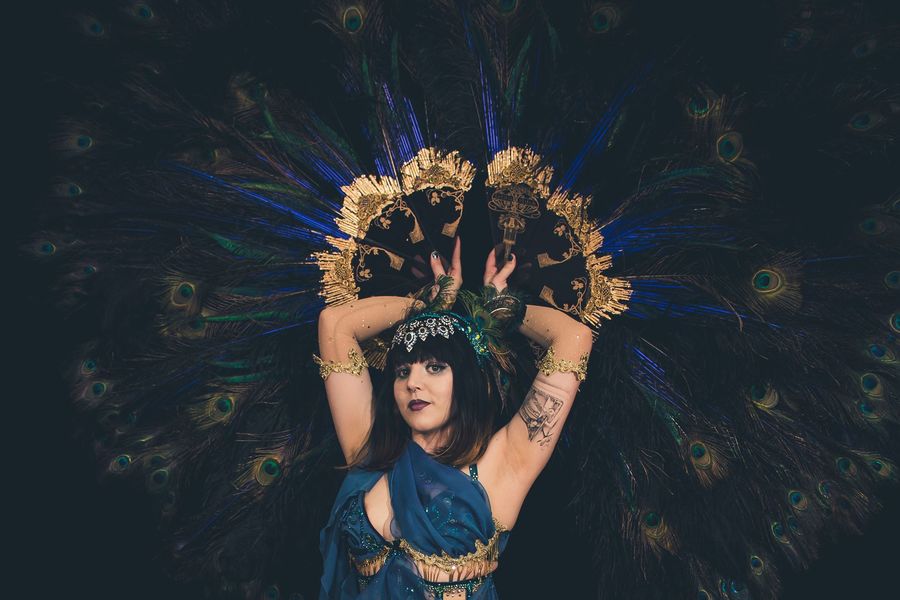Adelaide festivals: The Art of Accessibility
We look at how Adelaide's festivals promote inclusivity – and how that fosters the creative spirit

"Art must be life," writes Serbian performance artist Maria Abramović, "it must belong to everybody."
If the ownership of art is communal it stands that broader exposure and access to art forms, in both creative and exhibitive stages, embraces a greater cross section of the community and enriches the type of art created within it.
It is a responsibility that has been fiercely embraced by Adelaide Fringe and Adelaide Festival. As the enormous shift towards expanding venue accessibility and promoting inclusivity of artists with varied abilities continues, so too does the celebration of the emergence of art forms fostering new and changing perspectives.
This celebration began months ago when Warnambool-based artist Matthew Clarke, who identifies as having an intellectual disability, was chosen as the winning designer of the 2019 Adelaide Fringe’s official poster.
Clarke’s eye-catching abstract painting is a self-portrait of him as a performer at Adelaide Fringe. “For me, painting is about wanting to express my happiness to others,” Clarke said. “I’ve got a disability, so I’m quite proud to show there’s no barriers between that and making artwork.” Wine and Wallabies is Clark’s visual art exhibition for this Fringe season, and his Street Art piece on Union Street is included in the Street Art Explosion.
Access Champions
Similarly, both Adelaide Fringe and Adelaide Festival are proving there are no barriers around venue accessibility. Accessibility filters and Access Guides can be found on their respective websites, with extensive access information on language comprehension, sensory or communicative issues and locations of watering stations for service dogs. These filters revolutionise how to find the perfect event.
Equally as revolutionary is the Fringe’s new initiative which sees 20 Access Champion volunteers stationed at key events to support patrons with access needs. The volunteers will also liaise with Auslan interpreters and survey patrons on their experience to assist in the review of accessibility in key venues.
This is one of the most crucial components of diversifying accessibility – making sure it is successful by consulting the very people affected by those efforts.
Access Award
Adelaide Fringe has also partnered with the Can:Do Group to launch the ‘Access Award’ for the most accessible event. The deserved winner will be selected after the festival and awarded a handsome sum of $2,000. With the quantity and calibre of access events, it is difficult to predict who will be the recipient of such an award.
One clear winner already this year is the deaf community. Adelaide Festival has three Auslan interpreted shows in their program: Baba Yaga, Two Jews Walk into a Theatre…, and Man with the Iron Neck.
For any book lovers within the community, Writers’ Week is offering Auslan interpretations for all sessions when requested beforehand.
Adelaide Fringe will also include Auslan interpretation for Tindo Utpurndee, and for six artist events as selected by the deaf community. The latter is a significant initiative as it gives members the autonomy to hand-pick events they would love to experience straight out of the program.
Pay What You Can
There are of course other barriers which affect accessibility, including financial disadvantage. Adelaide Festival’s Pay What You Can initiative allows low income earners to buy tickets by donating an amount based on what they can afford.
If you have youth on your side, discounted tickets are available for most Adelaide Festival shows for Under 30s. There are also $10 rush tickets for under 18s. School bookings are subsidised to encourage whole class participation in the performing arts.
Last year the Fringe dedicated approximately $10,000 of the Artist Fund to buy tickets for community groups who assist low socioeconomic and disadvantaged groups. This year they are aiming to increase that figure to $24,000 to make the festival as inclusive as possible.
Artists Leading the Way
This inclusivity of course also extends to artists, with 54 registered performers and creatives on Adelaide Fringe's program who have access requirements.
2016 SA Slam Poetry Champion Alison Paradoxx examines the paradoxical life of living with a disability in Alison Paradoxx presents Floral Peroxide.
Burlesque queens who have lived with chronic illness and disability tell their stories in Singin’ in the Pain: A Disability and Chronic Illness Cabaret. Then registered blind actor and comedian Tom Skelton finally gets the chance to perform his favourite Shakespeare play in Tom Skelton’s Macbeth. No Strings Attached Theatre of Disability are bringing Ignition Point which gives a behind-the-scenes look into the ‘ignition point’ of their collaborative creative process. Tom GK and Tim Ferguson are presenting comedy solo hours about their lives with neurofibromatosis and multiple sclerosis respectively.
Adelaide Festival is also bringing Zizanie, a dance show for families with an inclusive cast performed by Restless Dance Theatre, whose goal is to create and present unexpectedly real dance theatre that is collaboratively devised, inclusive and informed by disability.
The devotion to expand accessibility and inclusivity is for the benefit of everyone as the creation of space for artists with unfamiliar perspectives to ask questions and explore their unique experiences is hugely important. Or as Abramović said, “the function of the artist in a disturbed society is to give awareness of the universe, [and] to ask the right questions.”
 Floods of Fire with Electric Fields & the ASO
Floods of Fire with Electric Fields & the ASO
 Review: Time Machine
Review: Time Machine
 Review: Antigone in the Amazon
Review: Antigone in the Amazon
 Review: I Hide in Bathrooms
Review: I Hide in Bathrooms